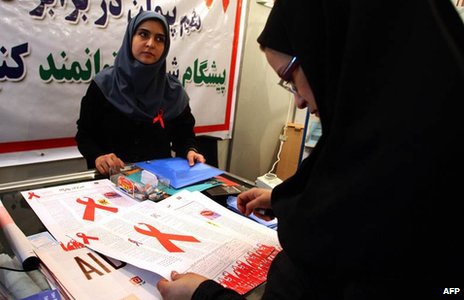 As Iran's economy has faltered and the cost of living has skyrocketed, Iranians living with HIV/Aids are struggling for survival.
As Iran's economy has faltered and the cost of living has skyrocketed, Iranians living with HIV/Aids are struggling for survival."Every week, I hear about someone with HIV dying," says an HIV-positive woman who spoke on condition of anonymity. "Healthy people have a lot of problems these days, too, but we're less capable of dealing with them."
She is one of an estimated 96,000 Iranians who the Joint United Nations Programme on HIV/Aids (UNAIDS) and Iran's government�say have HIV; only around a quarter of them have been identified.
Some observers suspect Tehran has underestimated these statistics to avoid darkening the country's Islamic credentials - a charge government officials deny.
Widespread stigma
In the 2000s, Iran became known as the region's leader in the fight against Aids. Each year, the government allocates millions of dollars to prevent and manage the disease, and government-sponsored clinics across the country help battle it.
Yet several HIV/Aids activists and Iranians infected with the virus argue that efforts to control the epidemic have suffered major setbacks in recent years, mostly because of the weakening economy and the widespread stigma of the illness.
"Many people with HIV can't find work and are sleeping on the streets," says Amir, an HIV-positive Iranian who agreed to speak only under a pseudonym. "The government was supposed to give us insurance and a monthly stipend, but it didn't. Thank God I have a job and a roof over my head."
Amir does not have to pay for antiretroviral drugs, which Iran's government provides for free. He says, though, that their quality has deteriorated and he cannot afford routine exams to check the status of HIV in his blood.
"For a time, I was even given drugs that had expired," he adds. "We also couldn't get influenza vaccinations this year. I don't know if these problems are due to sanctions."
Sanctions bite
UN, EU and US sanctions targeting Iran's nuclear programme exempt trade in medicine for humanitarian reasons. But with banking restrictions, high inflation, and the plunging value of Iran's currency, many drugs are costly and hard to find in Iran.
"With sanctions, groups like Iranians living with HIV are usually the first ones affected," says Dr Hamidreza Setayesh, a UNAIDS official for the Middle East. "Fortunately they have enough imported medications so far, but sooner or later they will be affected because the stock will finish."
Another challenge, Dr Setayesh says, is that the government has been cutting its HIV-AIDS budget, including funding for harm reduction among people who inject drugs, free condoms and birth-control programs. He attributes the cuts to inflation and a change in the country's family planning policies.
Iran's Supreme Leader, Ayatollah Ali Khamenei, has called the government's efforts to limit population growth a "mistake."
Iranian officials have also announced that a required "population and family planning" course will be replaced by�a class on "the glory of marital life"�in a number of universities.
Education
"The previous course included lessons on safe sex," says Dr Jamal Hekmat. "It's a shame it was cancelled."
Dr Hekmat has been educating Iranians about the virus through his Farsi-language website,�IranHIV.com.
Iran's government filters the site inside Iran, he says, and last week it was hacked for the second time. Every day, Iranians come to the site to ask basic questions about HIV.
"Unfortunately they don't know how to protect themselves," Dr Hekmat says. "Many young Iranians have premarital sex, so HIV is passing from person to person before marriage."
Iran's HIV epidemic is concentrated among the country's intravenous drug users and prisoners, but Aids experts warn that the virus will spread more widely if the country does not focus more on high-risk sexual behaviours, like unprotected sex, homosexuality, and prostitution.
'Not a priority'
Iran's health ministry recently acknowledged�that the prevalence of HIV among female sex workers has reached 4.5%.
The government has set up 21 centres offering HIV/Aids prevention and counselling to "vulnerable women", but Dr Arash Alaei, an HIV/Aids specialist, says more must be done.
"They need to improve outreach to sex workers, give them access to condoms, and have screening tests," he adds.
Dr Alaei believes that Iran's fight against Aids has become less progressive under President Mahmoud Ahmadinejad, who chairs a council that removed World Aids Day from Iran's national calendar last year.
In 2009, a court convicted Alaei and his brother, Kamiar, of "having relations with hostile governments" and "tainting Iran's reputation" - charges they say stem from their�work on HIV/Aids.
They were released in 2011 after serving part of their terms in Tehran's Evin prison.
Youths
Iran's government should focus more on tackling HIV/Aids among all Iranian youth, especially gay Iranians, according to activist Arsham Parsi.
Last year, he created the Toronto-based�Network of Iranian Queer HIV/Aids�to counsel gay Iranians with the virus.
One of them is Ali, a pseudonym for a 22-year-old gay Iranian seeking asylum in Canada.
"I was afraid something bad would happen to me in Iran because I'm gay and HIV positive, so I left," he says.
"I didn't have any information about the virus before I was diagnosed with it. Now I'm worried about other Iranians who don't know yet that they themselves have HIV."
By BBC
The Iran Project is not responsible for the content of quoted articles.











